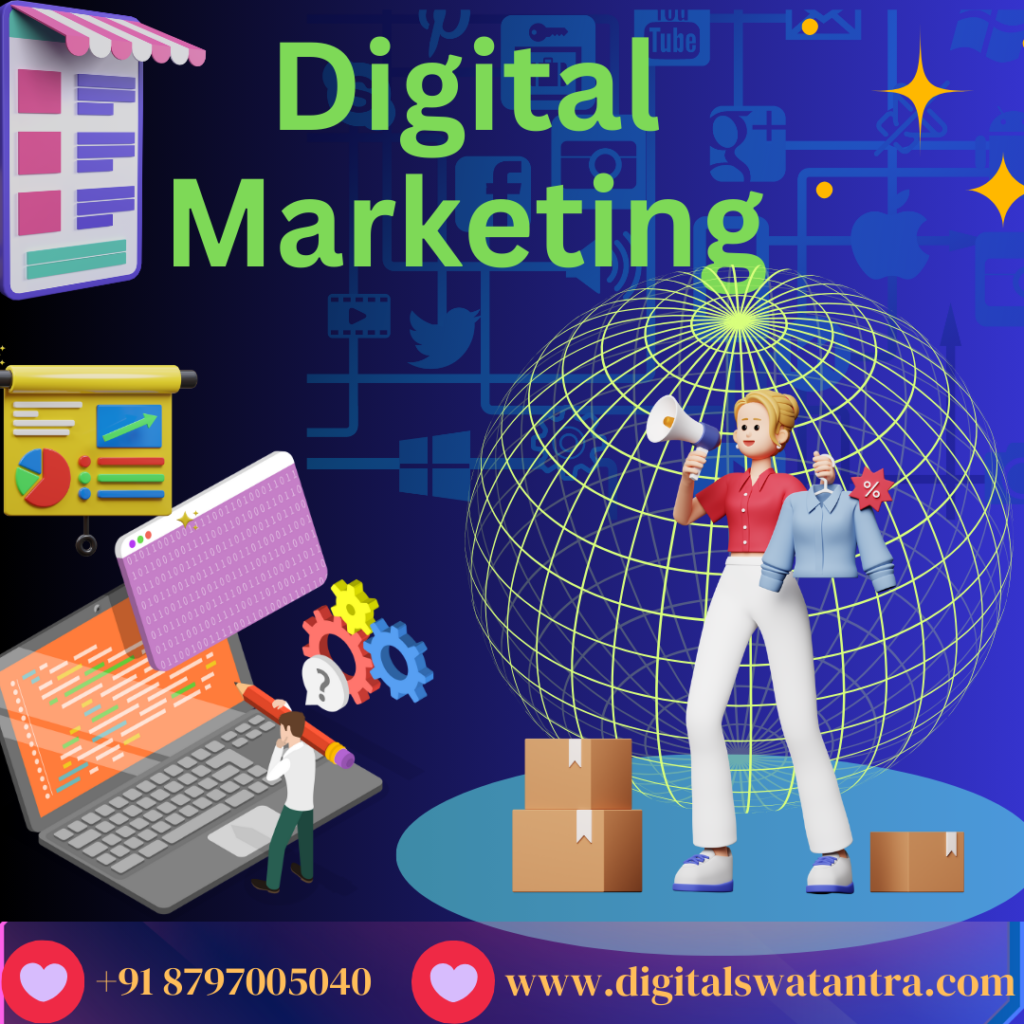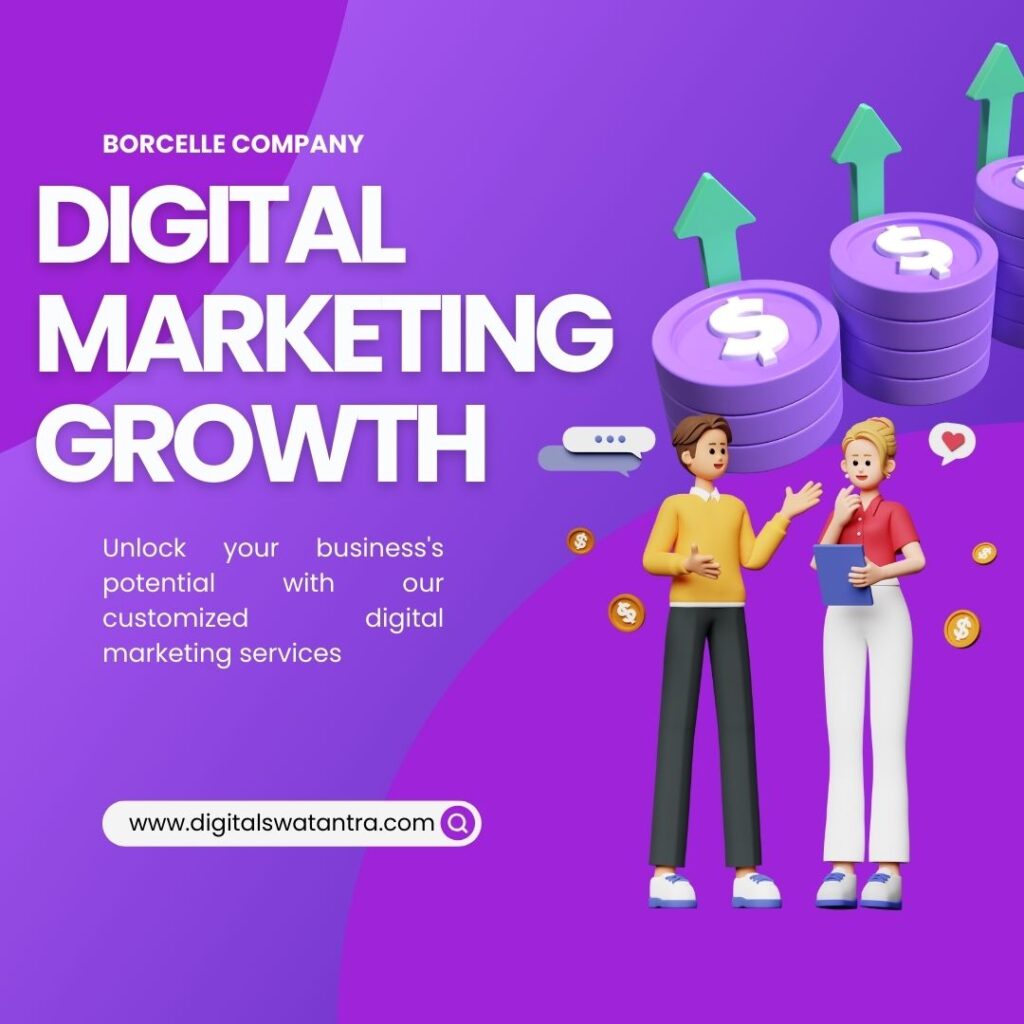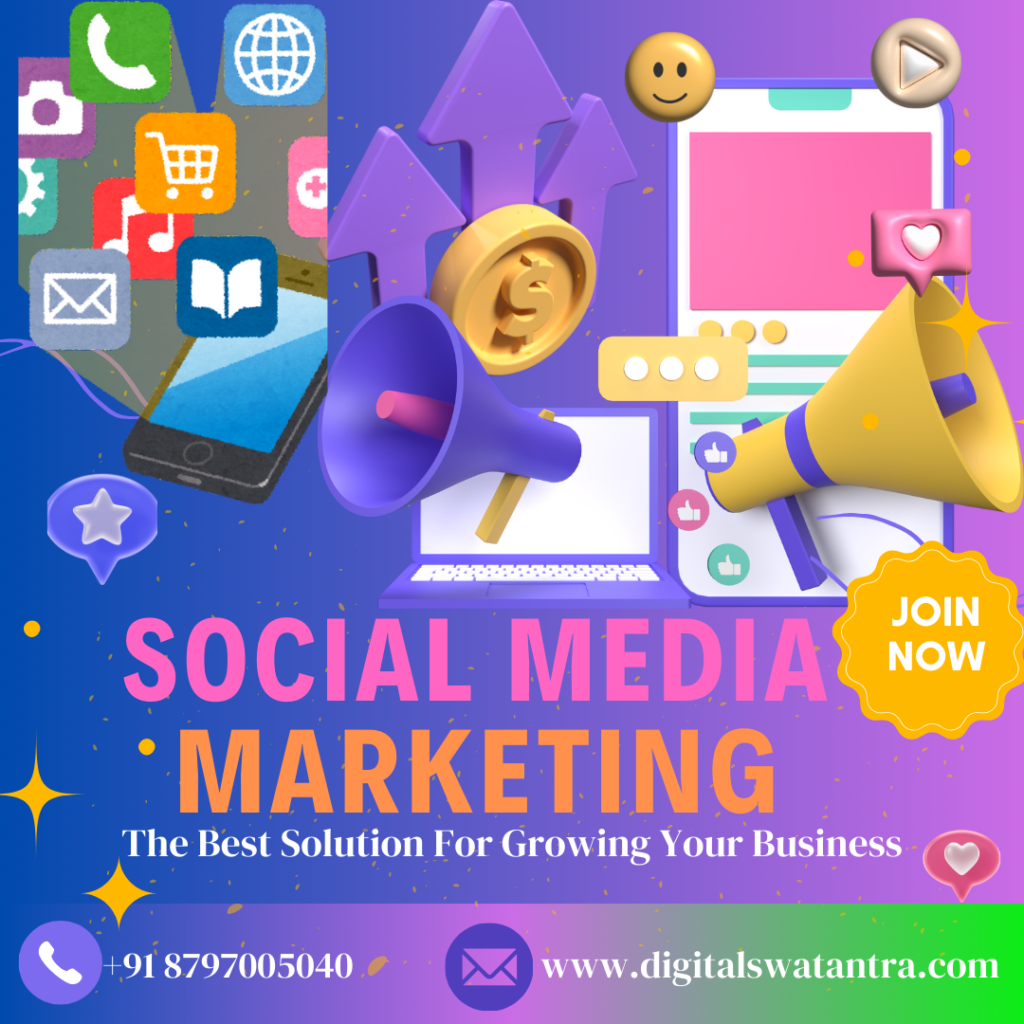Digital Marketing meaning in business typically refers to online marketing campaigns that appear on a computer, phone, tablet or other device. It can take many forms, including online video, display ads, Search engine marketing, Paid social ads and social media posts.
Did you know nine-in-ten U.S. adults go online on a daily basis? Not only that, 41% are online “almost constantly”. As a marketer, it’s important to take advantage of the digital world with an online advertising presence, by building a brand, providing a great customer experience that also brings more potential customers and more, with a digital strategy.

A digital marketing strategy allows you to leverage different digital channels-such as social media, pay-per-click, search engine optimization and email marketing to connect with existing customers and individuals interested in your products or services. As a result, you can build a brand, provide a great customer experience, bring in potential customers and many more.
What is digital marketing meaning?
Digital marketing meaning in business is the use of internet mobile and other electronic devices. It leverages all digital platforms and social media channels, such as face-book, you-tube, linkedin, twitter, instagram etc.
Digital marketing for business is the practice of promoting your products, services, or brands through digital channels such as search engine, social media, emails, and website. Digital marketing focuses on reaching audiences online where they spend a significant amount of time.
One of the main advantages of digital marketing is its ability to target specific audiences with precision, ensuring that marketing efforts reach the right people at the right time. Additionally, digital marketing highly measurable, allowing businesses to track the performance of their campaigns in real time and make data driven decisions to optimize results. This approach is not only increases the brand awareness but also drive traffic generates leads, and ultimately boosts sales.
Digital marketing versus inbound marketing
Digital marketing meaning in business is the uses many of the same tools as inbound marketing- emails and content marketing. Both tactics exist to capture the attention of prospects through the buyer’s journey and turn them into customers.
On the other hand, Inbound marketing is a more focused subset of digital marketing, though it can also include offline methods. The core philosophy of inborn marketing is to attract customers by providing valuable content and experience age tailor to their needs. Instead of purchasing a product or service onto the customer (as in traditional marketing), Inbound marketing draws customers in by offering solutions to their problems, which builds trust and credibility over time.
Inbound marketing typically involves creating content that addresses the pain points of potential customers, such as blogs, ebooks, webinars, and social media posts. This content is designed to attract, engage and delight customers. Ultimately converting them into loyal advocates, the goal is to nurture leads through the buyer’s journey- from awareness to consideration to decision- by providing the right content at the right time.
Key Differences
1. Approach and Philosophy
2. Audience Interactions
3. Long Terms vs. Short-Terms
4. Measurement and ROI
Why is digital marketing important?

Digital marketing can help your business thrive worldwide. Digital marketing has become Increasingly important because of its accessibility. In fact, there were 5 billion internet users globally in April 2022 alone.
Digital marketing meaning is the leverages all social media channels and digital platforms such as facebook, youtube, instagram, linkedin, besides its social media optimization, search engine optimization, search engine marketing, email marketing etc. From social media to text messages, There are many ways to use digital marketing tactics in order to communicate with your target audience.
B2B versus B2C digital marketing
Digital marketing meaning is the strategies Work for B2B business to business and B2C business to consumer companies. but the best practices before significantly between the two. Here is a glance at how digital marketing is used in B2B and B2C marketing strategies.
1. B2B Sales: B2B sales is generally longer and more complex involving multiple tech-points and a more deliberate decision making process. B2B marketers must focus on lead nurturing and providing value at each stage of the customer journey from awareness to consideration to decision. This often involves a combination of content marketing, email campaigns, and account based marketing to guide prospects through the sails funnel.
. B2C Sales: In contrast, the B2C sales is typically sorter with consumers often making Purchase decisions Quickly. B2C marketers aim to create a seamless and engaging customer experience that encourages immediate action. This includes using targeted ads, social media engagement, and e-commerce Strategies To drive conversions.
2. B2B Marketing: In the B2B space, businesses market their products or services to other companies. The decision making process in B2B marketing is typically more complex and involves multiple stakeholders, Such as procurement officers, managers and executives.
. B2C Marketing: On the other hand, B2C digital marketing targets individual customers. The decision making process is usually more straightforward, with a shorter sales cycle. B2C marketing strategies tend to focus on emotions, brand experience, and immediate gratification.
3. B2B Content: B2B content is typically more formal, data driven, and focused on providing solutions to specific business challenges. The goal is to position the brand as an expert and trusted partner in the industry. The messaging is open centred around efficiency, productivity, cost effectiveness and how the product or service can solve a specific problem
. B2C Content: In contrast, B2C content is generally more engaging, entertaining, and emotionally appealing. The aim is to create a connection with the customer typing into their desire, needs and lifestyle. B2C marketers often use storytelling humour and visual content to create a memorable brand experience.
4. B2B Channels: B2B marketers often rely on channels that facilitate direct communication and provide opportunities for building relationships. LinkedIn is a key platform for B2B marketing, offering tools for networking, lead generation and content sharing. Email marketing is also a critical channel used to nurture leads and maintain relationships with prospects over time. Additionally, SEO and content marketing are vital for driving organic traffic to B2B websites.
. B2C Channels: B2C marketers use a broader range of channels to reach a larger and more diverse audience. Social media platforms like facebook, Instagram and Tik Tok are particularly effective for B2C marketing allowing brands to engage with customers from visual content, influencer partnerships and interactive campaigns.
Types of digital marketing
As there are ways of interacting using digital media there are many specialisations within digital marketing. Here are a few key examples of types of digital marketing tac tactics.
Search engine optimization:
Search engine optimization is a technical part of digital marketing. SEO is a technique of increasing the quality and quantity of website traffic by increasing the visibility of a website on search engine result page(SERP). SEO is the method of making a web page easy to find, easy to crawl, and easy to categorise. It is about serving your customers to find out your business from among thousands of other companies.It is basically concerned with a holistic move towards driving customers to your business via online platforms. And to do that, one must ensure that the website ranks higher in the SERP (search engine result page).
Things to know about search engine optimizer (SEO)
. SEO is a long term strategy.
. It is part of inbound marketing and SEM.
. SEO gives you better ROI compared to other channels.
. SEO is difficult, complex and time consuming but delivers better results if Implemented properly.
Content marketing:
Content is the king of any digital marketing and online media. Whenever users go to a site first, we will find the content. Writing blocks, making videos and image creation increase the rank of the website, which helps In the gradual increase in viewers. As mentioned, the quality of your content is a key component of an optimised page. As a result, SEO is a major factor in content marketing.
The goal of content marketing is to attract leads that ultimately convert into customers. but it does so differently than traditional advertising.
Social media marketing:

Social media marketing is everywhere. Social media marketing is all about the use of social network platforms and social media channels for marketing purposes. Social media marketing is now becoming more and more popular as access to the internet and high rate of diffusion of smartphones, even in rural areas are the main reasons. Social media marketing is now used to promote business using social networking platforms like Facebook,YouTube, Instagram, Google and linkedin and many more such popular social networking websites.
. Social media marketing is growing very fast.
. Social media advertising is also a part of social media marketing.
. Craft high quality and engaging content.
. Social media marketing has both organic and paid channels.
. Reply comments and questions in a professional manner.
PPC Marketing (Pay-per-click marketing):
Pay-per-click marketing is usually known as paid marketing. It is one of the fastest ways to rank high in the organic search result. PPC is the paid digital marketing strategy. Google ads is the most popular PPC platform for search engines, but bing ads is the second most popular platform. Facebook ads, Google ads, Youtube ads and even Amazon ads are also valuable platforms for PPC. Each time when your ads is clicked by someone, you are then charged with some amount, that is why it is called pay-per-click marketing.
. Ad quality
. Keyword relevance
. Landing page quality
. Bid amount
Email marketing:
Email marketing is a form of direct marketing, where you reach out to your customers through strategic email messages. Email is still the quickest and most direct way to reach customers. When people find email in their inbox, they have a feeling of exclusiveness as if it is only for him and no one else gets this opportunity. Marketing through email helps the customer and makes them know in detail about their requirements.
Email marketing is a very old marketing channel And it is also changing very fast. Email is one of the most preferred communication channels for marketing after SMS. It is a communication channel between buyers and the brands. Everyday email marketing is improving and now email marketing has become a part of marketing automation.
Marketing automation is the future of email marketing:
. Email marketing is now becoming a part of marketing automation.
. Email marketing is a very effective medium for communication.
. Email marketing offers much better ROI compared to many other marketing channels.
Affiliate marketing:
Affiliate marketing is performance based marketing. The concept of affiliate marketing is similar to commission based sales. Organisations provide their custom links to their affiliates. affiliators on a specific Commission every time someone wise through their custom link. This process begins with the merchant partnering with affiliates, either directly or through an affiliate network.Affiliate Promote the merchant products using various online channels such as blogs, social media, email marketing and websites to share a unique referral link provided by the merchant.This model is Beneficial for both parties.
How it works- 4 simple steps:
. Join an affiliate programme.
. Pick a product you want to promote( you will get a unique affiliate link)
. Share the link via Facebook, YouTube video, Blogs, email or any other forms.
. When someone purchases the recommended product, you will get a handsome Commission.
Influencer marketing:
Influencer marketing Is a form of social media marketing that involves collaboration between brands and individuals with a substantial and engaged following- known as influencers. These influencers are trusted figures within a specific niche or community, Whether it’s fashion, beauty, fitness, technology or any other field. Their followers value their opinions and recommendations, making influencers powerful allies for branch looking to build trust and drive conversions
Influencers typically share content In the form of posts, videos, stories and live streams across platforms like Instagram, youtube, twitter, tik-tok and more. Through these collaborations, brands can promote their products or services to a highly target and engaged audience.
Mobile marketing:
Mobile marketing is a type of digital marketing strategy that allows you to engage with your target audience on their mobile devices. Mobile marketing Is a relatively new branch in marketing that would refer to the two way communication between customer and the company through mobile devices. Mobile marketing formats such as stories and short oriented videos in app advertising are taking the centre spot in DM trends. It is crucial to ensure that all content is optimised for mobile devices.
Marketing automation:
Marketing automation Refers to the use of software platforms and Technologies To automate repetitive marketing tasks and workflows. These tasks include email marketing, social media posting, lead generation, customer segmentation, campaign management and more. The goal of marketing automation is to nurture leads, improve customer engagement, and ultimately drive sales.
By automating processes, businesses can deliver the right message to the right person at the right time, based on data-driven Insights and predefined triggers.This not only enhance the efficiency of marketing operations but also enables a more personalised and targeted approach to customer engagement.
Digital marketing creates growth
Digital marketing meaning in business drives business growth by leveraging online channels to reach and engage with a vast audience. Through strategies like SEO, social media marketing, email campaigns, and paid advertising, businesses can target specific demographics, build brand awareness, and convert leads into customers. Digital marketing’s ability to provide real-time analytics allows companies to measure the effectiveness of their campaigns, optimise their strategies, and achieve higher ROI. By creating personalised and impactful customer experiences, digital marketing fosters long-term customer relationships, ultimately leading to sustained business growth.
